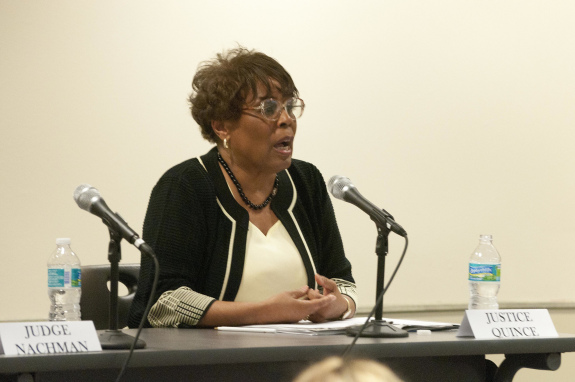
Florida Supreme Court Justice Peggy Quince– a Jeb Bush appointee– was the first black woman appointed to the bench. Gov. Bush’s successor, Rick Scott, has been appointing fewer black judges. (Photo via the Florida Coastal School of Law/Creative Commons)
By Ashley Lopez
Florida Center for Investigative Reporting
This week, The Tampa Bay Times/Miami Herald published a story looking at the number of African-American judges appointed under the Scott Administration compared to administrations before him. In short, Gov. Rick Scott is falling short of his predecessors.
According to the Times/Herald:
Scott has appointed nine black attorneys to judgeships in nearly four years, according to data from his office. They include reappointments of three judges who hear job-related injury claims and four county judges who decide small claims and traffic cases.
Only twice has Scott appointed black judges to the more prestigious trial court or circuit court, and both are in Miami-Dade County: Eric Hendon and Rodney Smith in 2012. Thirteen of Scott’s 14 choices for district courts of appeal judges are white and the other is Hispanic.
“What I’m focused on is making sure that the people I appoint understand that there are three branches of government and that they don’t get to legislate,” Scott said in an interview with the Times/Herald. “They don’t get to pass laws, just like I don’t get to pass laws.”
As African-Americans now make up a slightly smaller percentage of the pool of judges than before Scott took office, he faces criticism from the Florida Bar and the Legislature’s black caucus.
Scott’s critics say this is a sign of the governor’s lack of interest in diversity in Florida’s court system. However, Scott’s office argues it is a reflection of the lack of diversity in the pool of lawyers in the state. Bar membership in Florida is only 3 percent black in Florida.
But, governors before Scott appointed more African-Americans to judgeships with similar bar membership numbers.
The Times/Herald reports,
During the same 44-month time frame as Scott, former Gov. Crist appointed 12 African-American judges, including James Perry to the Florida Supreme Court when Crist was a Republican. As Scott’s Democratic opponent, Crist is relying on overwhelming support from black voters in the Nov. 4 election.
Former Gov. Bush had appointed 22 black judges up to this point in his tenure, including Peggy Quince, the first black female justice on the Supreme Court, a choice he approved along with Democratic Gov. Lawton Chiles, days before Chiles died in 1998.
In direct comparison, Scott has appointed black attorneys to judgeships 5.7 percent of the time. Crist’s overall record was 8.3 percent and Bush’s was 10 percent.
This isn’t the first dust up over Scott’s judicial appointments.
A year ago, Steve Bousquet at the Times/Herald also reported that Sott was raising eyebrows for the number of people he was rejecting from the Florida Bar’s recommended list of candidates for the judicial nominating commission.
Florida’s judicial nominating commission is a group of lawyers that screens people for potential judge positions in the state. Experts have said the number of people that Scott has rejected from the Florida Bar’s list is unprecedented. Bousquet described it as an effort by Scott to “bring the court system more in line with his conservative outlook.”
According to the Times/Herald in Tallahassee, Scott rejected the Bar’s lists “16 times and has never publicly given a reason and is not required to do so.”
Furthermore, Bousquet reported, “lawyers who are registered Democrats, are aligned with left-leaning groups or who promote themselves as trial lawyers appear to have little hope of gaining the governor’s favor.”
Scott, who is facing a tough re-election against predecessor Charlie Crist, also may be tasked with replacing four of the seven Florida Supreme Court Justices if he wins in November. Four justices will have to retire by the time a newly elected governor leaves office. Among those forced to retire are two of the court’s only black justices: James Perry and Peggy Quince.
